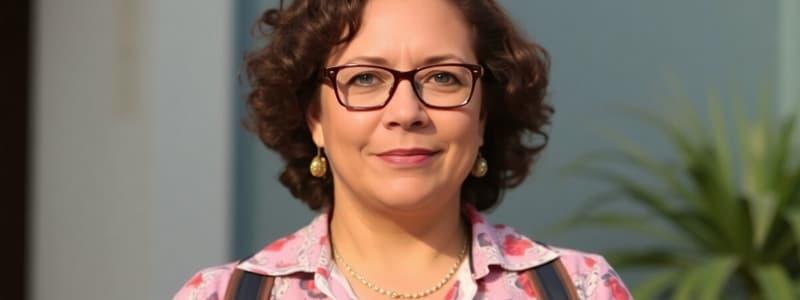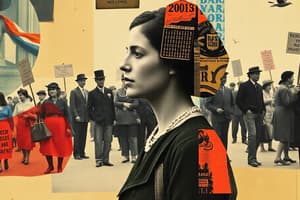Podcast
Questions and Answers
Match Abby Kelley Foster's actions with their descriptions:
Match Abby Kelley Foster's actions with their descriptions:
Speaking against slavery = Refused entry to churches and town halls Giving antislavery lectures = Inspired crowds of thousands Holding outdoor meetings = Faced violence and harassment Working as a teacher = Supported her education financially
Match the following events with their outcomes related to Abby Kelley Foster:
Match the following events with their outcomes related to Abby Kelley Foster:
Mob attack at the lecture hall = Building burned to the ground Public speaking engagements = Women speaking alongside African Americans Antislavery position adoption = Considered extreme views of the time Teaching in Lynn = Introduced to William Lloyd Garrison
Match the following individuals with their roles or descriptors related to Abby Kelley Foster:
Match the following individuals with their roles or descriptors related to Abby Kelley Foster:
William Lloyd Garrison = Antislavery lecturer Lucretia Mott = Fellow speaker at the lecture Preacher at the church = Condemned Abby as a Jezebel Older married sister = Assisted Abby financially for her education
Match the quotes or significant actions to Abby Kelley Foster's character:
Match the quotes or significant actions to Abby Kelley Foster's character:
Match the places Abby Kelley Foster visited or worked with their significance:
Match the places Abby Kelley Foster visited or worked with their significance:
Match the following descriptions with their corresponding aspects of Abby Kelley Foster's activism:
Match the following descriptions with their corresponding aspects of Abby Kelley Foster's activism:
Match the societal reactions to Abby Kelley Foster's activism:
Match the societal reactions to Abby Kelley Foster's activism:
Match the notable features of Abby Kelley Foster's speeches with their impact:
Match the notable features of Abby Kelley Foster's speeches with their impact:
Match the following historical events with their descriptions:
Match the following historical events with their descriptions:
Match the following individuals with their contributions to the suffrage movement:
Match the following individuals with their contributions to the suffrage movement:
Match the following statements to the individuals they were said by:
Match the following statements to the individuals they were said by:
Match the following phrases with their historical significance:
Match the following phrases with their historical significance:
Match the following locations with their relevance to the suffragists:
Match the following locations with their relevance to the suffragists:
Match the following suffrage strategies with their descriptions:
Match the following suffrage strategies with their descriptions:
Match the following suffragists with their characteristics:
Match the following suffragists with their characteristics:
Match the following themes with their related aspects of the suffrage movement:
Match the following themes with their related aspects of the suffrage movement:
Flashcards
Who was Abby Kelley Foster?
Who was Abby Kelley Foster?
Abby Kelley Foster was a passionate abolitionist who spoke out against slavery in the 1830s and 1840s. She was known for her powerful speeches and her willingness to challenge societal norms by speaking out against slavery.
What challenges did Abby Kelley Foster face?
What challenges did Abby Kelley Foster face?
Due to her bold views on abolition, Abby Kelley Foster was often criticized and ostracized by society. People even compared her to a biblical villain and refused her entry to public spaces.
What were Abby Kelley Foster's beliefs about ending slavery?
What were Abby Kelley Foster's beliefs about ending slavery?
Abby Kelley Foster believed that achieving true equality for African Americans required not only the abolition of slavery but also the end of the slave trade and the granting of full civil rights.
How did Abby Kelley Foster overcome obstacles in her abolitionist work?
How did Abby Kelley Foster overcome obstacles in her abolitionist work?
Signup and view all the flashcards
What impact did Abby Kelley Foster's speeches have?
What impact did Abby Kelley Foster's speeches have?
Signup and view all the flashcards
Describe the incident in Philadelphia.
Describe the incident in Philadelphia.
Signup and view all the flashcards
What was the significance of the Philadelphia incident?
What was the significance of the Philadelphia incident?
Signup and view all the flashcards
What is Abby Kelley Foster's lasting legacy?
What is Abby Kelley Foster's lasting legacy?
Signup and view all the flashcards
What was the cry of "Taxation without representation"?
What was the cry of "Taxation without representation"?
Signup and view all the flashcards
What did Abby Foster believe was more important than harmony?
What did Abby Foster believe was more important than harmony?
Signup and view all the flashcards
Why did the Fosters refuse to pay taxes?
Why did the Fosters refuse to pay taxes?
Signup and view all the flashcards
How did the Fosters protest 'taxation without representation'?
How did the Fosters protest 'taxation without representation'?
Signup and view all the flashcards
Why did suffragists rely on speaking tours?
Why did suffragists rely on speaking tours?
Signup and view all the flashcards
Who mentored prominent suffragists like Lucy Stone and Susan B. Anthony?
Who mentored prominent suffragists like Lucy Stone and Susan B. Anthony?
Signup and view all the flashcards
What were Lyceum's?
What were Lyceum's?
Signup and view all the flashcards
What was Abby Foster's message about the legacy of women's suffrage?
What was Abby Foster's message about the legacy of women's suffrage?
Signup and view all the flashcards
Study Notes
Abby Kelley Foster
- Born January 15, 1811, died January 14, 1887
- Early life: Born into a Quaker farm family in Pelham, Massachusetts
- Education: Attended Quaker boarding school in Providence, Rhode Island, worked to pay for education
- Career: Teacher, abolitionist speaker, advocate for women's rights
- Public speaking: Met opposition and hostility, often attacked
- Antislavery activism: Became an active supporter of William Lloyd Garrison's antislavery cause
- Public appearances: Faced opposition, held meetings outdoors in fields/orchards
- Considered extreme views: Faced public backlash for her antislavery and women's rights stances
Public Speaking and Opposition
- Public speaking style: Engaging and persuasive
- Objections and reactions to her speeches: faced hostility, threats, and violence (e.g., groups throwing rotten fruit and stones)
- Audience reaction: initially met with hostility, especially from those in positions of power such as men in the community
- Continued activism for the sake of her mission: persisted in her beliefs/activities despite opposition
- Mob violence in Philadelphia: Fought off threatening crowds
Women's Rights and Abolitionism
- Early suffragist advocate: advocated for the rights of women
- Actively involved in abolitionist movement: strong advocate for abolishing slavery
- Beliefs considered radical: views were considered extreme during her time
- Impact of her activism: her activism paved the way for future women's rights figures
- Tactics: used speaking tours and meetings with large audiences
Foster and The Underground Railroad
- Involvement with the Underground Railroad: her home was a stop on the Underground Railroad
- Resistance to taxation: Refused to pay taxes in support of women's rights
- Public auction protest: Protested “taxation without representation”
- Publicly fought for her beliefs: publicly argued her position
Lessons Learned
- Obstacles faced: faced significant challenges due to her stance on abolition and women's rights
- Perseverance: demonstrated remarkable determination in her work
- Influence on her contemporaries: inspired others in women's rights movement
- Legacy: continued to fight for what she believed in against opposition and odds
Studying That Suits You
Use AI to generate personalized quizzes and flashcards to suit your learning preferences.
Related Documents
Description
Explore the life of Abby Kelley Foster, a prominent abolitionist and advocate for women's rights. This quiz covers her early life, education, career, and the challenges she faced in public speaking against opposition. Test your knowledge on her significant contributions to social justice.




